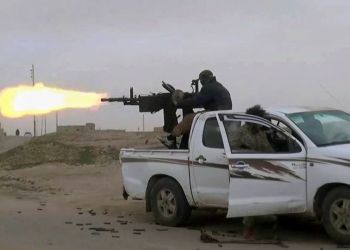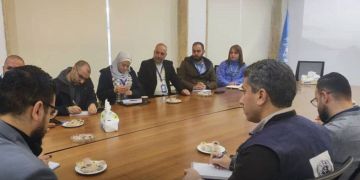This post is also available in:
![]() العربية
العربية
In light of the absence of a mobile communication network, the number of internet salons has increased in all the areas in Deir Ezzor. They have also become a source of income for many civilians living in the province. The use of internet has reached all the civilian homes; however, it still has both negative and positive effects on the society. Among the positive effects is that the world has become a smaller and more integrated place. The internet use has also left a bit of optimism in a wrecked and shaky society in Syria. Moreover, it has made the situation in Syria known to everyone as the news are transmitted instantaneously.
The most popular means
The communication between the families who have been displaced and now are living in every corner of the world has had a positive impact on their lives, as it has eased a lot of mental fatigue, and reduced the spread of rumors among them. However, the excessive openness to technology and communications without controlling and monitoring their negative impact on the society, mainly the youth, has brought into being a couple of ideas and habits which are considered strange to our society, some of which are even denounced.
In the meantime, as the region is in a state of war, the use of the net has played an important role, making it easier to penetrate the military battalions and revealing many of their secrets. Many of the accounts, which belong to activists and military commanders, were monitored and tracked as well. It has also been the key tool by which the sleeper cells in the regime-held areas kept themselves in direct contact with their leaders and operation rooms in rebel’s territory.
Internet cafes have remained the only means of communication after ISIS gained control over most of the areas in the province of Deir Ezzor . The group had raided the headquarters of the battalions and brigades of the Free Syrian Army in the province, and seized their contents. It also raided the rebels ‘media centers under various charges, and confiscated all of their contents and properties. Furthermore, the group arrested several media activists, some of whom were liquidated.
As time has passed, the internet cafes in Deir Ezzor have become under full ISIS surveillance, mainly by ISIS Hisbah police, who have begun to intervene in the internet cafes’ affairs. In the beginning, they prosecuted women for the lawful Islamic dress that they must wear in case they want to enter internet cafes. After that, women were allowed entry on condition that they must be accompanied with a Mahram. Men were also harassed concerning the issues of smoking and Islamic dress. The owner of internet cafes were also warned to close their shops during prayer times, from the beginning of Adan until the people come out of mosques.
The group also formed another branch within its so-called “Office of communications services’’ and named its head as ‘’ the Ameer of the Internet and communications’’. The newly established ISIS office began to issue decisions respectively, separating internet salons into two different categories, one for women only and another one for men.
Each internet salon has its own rules
Internet cafes for women must be covered completely, and a woman must manage it. All women are required to wear Islamic dress, and men are banned from entering such salons, whatever the reasons are. Women are also required to give their personal info to the owner of the internet cafes during each visit. After all these conditions, the ISIS-linked Office of Communications issued in the end a ban on all women’s internet cafes in the province of Deir Ezzor.
The internet cafes for women had been subjected to continuous and sudden raids by ISIS Hisbah police, aimed at what they described ‘’ suppressing the unlawful acts’’. Some ISIS affiliated women used to monitor the internet cafes for women, and report any irregular acts and violations, including conversations between civilians in Deir Ezzor and their families abroad. Pre-made charges of spying and communication with the outside world, such as Turkey, the Gulf, and others, were ready even if a mother was caught speaking to her son in an ISIS-run internet salon.
The internet cafes for men have witnessed more severe security measures. Surveillance cameras are placed in the salons, and the latter have been arranged in a way that they have become limited to people of each region in their area. ISIS Hisba police are monitoring the salons on a daily basis, registering the names of the customers, and watching people leaving and entering the salons. ISIS did not stop at this point as its linked office of communication has also issued a severe decision, suspending and confiscating the property of each internet salons, in case they do not limit the use of Wifi to their salons.
Thus, ISIS managed to limit the use of communications in the Internet cafes to facilitate the process of monitoring them by ISIS Hisba members. In the same context, the ISIS-linked Office of communications issued several conditions that must be met by anyone who wants to open an internet salon in Deir Ezzor.
Implementation under the threat of punishment
The group has closed many internet cafes, and as a result, internet salons have become overcrowded as their number have decreased. For instance, we could observe fifty women in one single internet salon. In addition, sometimes every civilian bring with him some members of his family to the internet cafes to communicate with the rest of the family living abroad.
Moreover, the Internet cards prices have recently began to rise. 60 megabytes used to be sold for 200 Syrian pounds, however, after the newly ISIS imposed laws by its office of communication, the prices of internet cards increased to reach 100 Syrian pounds for one day, then it was reduced to eight hours only. Some internet cafes owners terminate the card as soon as the customer leaves their salons, even if he does not use it.
The prices of internet cards are linked to the price of the US dollar, as is the case with everything in Syria. The Internet cafes in Deir Ezzor province rely mainly on satellite transmission systems, which are based on the monthly shipment ranging from 8 GB to 50 GB, and an extended limited range between three months and six months. They are recharged in dollars in some neighboring countries. It is worth mentioning that ISIS has banned recharging internet cards from other companies, and has linked all the internet cafes to networks affiliated with the group. In Albu Kamal, for example, there are four main companies belonging to the ISIS, which are responsible for supplying internet cafes with a limited megabytes range and slow connection.
After all of these steps, conditions, and restrictions, ISIS has managed to fully control the communication sector in the province of Deir Ezzor.












